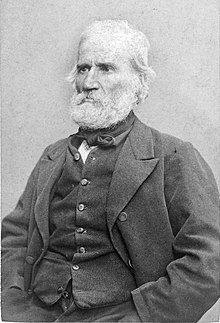Louis Auguste Blanqui
You can help expand this article with text translated from the corresponding article in French. (December 2022) Click [show] for important translation instructions.
|
Louis Auguste Blanqui | |
|---|---|
philosopher | |
| Known for | Blanquism |
| Parent |
|
| Relatives | Jérôme-Adolphe Blanqui |
Louis Auguste Blanqui (French pronunciation:
Biography
Early life, political activity and first imprisonment (1805–1848)
Blanqui was born in
Implicated in the armed outbreak of the
Release, revolutions and further imprisonment (1848–1879)
He was released during the
In 1865, while serving a further term of imprisonment under the Empire, he escaped, and continued his

He was one of the group that briefly seized the reins of power on 31 October and for his share in that outbreak he was again condemned to death
Ideology
As a socialist, Blanqui favored what he described as a just
Death

Following a speech at a political meeting in Paris, Blanqui had a stroke. He died on 1 January 1881 and was interred in the Père Lachaise Cemetery. His elaborate tomb was created by Jules Dalou.
Legacy
Blanqui's uncompromising
The Italian fascist newspaper Il Popolo d'Italia, founded and edited by Benito Mussolini, had a quotation by Blanqui on its mast: Chi ha del ferro ha del pane ("He who has iron has bread").[5]
Blanqui's political activism and his book L'Eternité par les astres were commented on by Walter Benjamin in his Arcades Project and are referred to in the novel The Secret Knowledge by Andrew Crumey.
See also
- French demonstration of 15 May 1848
- La patrie en danger
- No gods, no masters
- Eternal return
Works
French
- L'Armée esclave et opprimée
- Critique sociale: Capital et travail
- Critique sociale: Fragments et notes
- Instructions pour une prise d'armes.
- Maintenant il faut des armes
- Ni dieu ni maitre
- Qui fait la soupe doit la manger
- Réponse
- Un dernier mot
English translations
- The Eternity According to the Stars, tr. by Mathew H. Anderson, with an afterword by Lisa Block de Behar ("Literary Escapes and Astral Shelters of an Incarcerated Conspirator"). In CR: The New Centennial Review 9/3: 61–94, Winter 2009. The first full-length translation into English.[6]
- Eternity by the Stars. Frank Chouraqui, trans. New York: Contra Mundum Press, 2013.
Footnotes
- ISBN 978-2-7483-5392-1. Retrieved 31 August 2015.
- ISBN 0674008022.
- ^ Blanqui, Auguste (1805-1881) Auteur du texte (1832). Défense du citoyen Louis Auguste Blanqui devant la Cour d'assises : 1832 (in French). p. 14.
{{cite book}}: CS1 maint: numeric names: authors list (link) - Marxists.org, last retrieved 25 April 2007
- ^ Christopher Hibbert, Mussolini: The Rise and Fall of Il Duce, New York: NY, St. Martin’s Press, 2008, p. 21. First published in 1962 as Il Duce: The Life of Benito Mussolini
- ^ "Editors' Note".
- This article incorporates text from a publication now in the public domain: Chisholm, Hugh, ed. (1911). "Blanqui, Louis Auguste". Encyclopædia Britannica (11th ed.). Cambridge University Press.
Further reading
- Mitchell Abidor (trans.), Communards: The Story of the Paris Commune of 1871 as Told by Those Who Fought for It. Pacifica, CA: Marxists Internet Archive, 2010.
- Doug Enaa Greene, Communist Insurgent: Blanqui's Politics of Revolution. Chicago: Haymarket Books, 2017.
- Patrick H. Hutton, The Cult of the Revolutionary Tradition: The Blanquists in French Politics, 1864-1893. Berkeley CA: University of California Press, 1981
- OCLC 984463383.
External links
- Louis-Auguste Blanqui Archive at Marxists Internet Archive
- The Blanqui Archive at Kingston University
